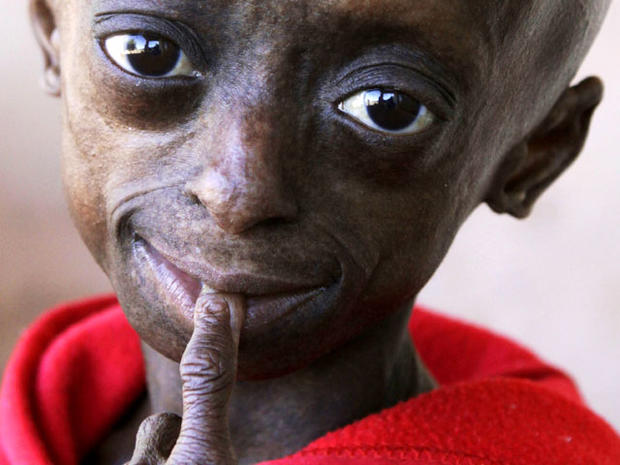Progeria diagnosis makes black child one of a kind
(CBS/AP) Ontlametse Phalatse calls herself a "first lady" because she's the first black child diagnosed with progeria, the rare and fatal genetic disease that causes accelerated aging.
PICTURES - Progeria: First black child with rare aging disease
The 12-year-old South African girl with the elfin appearance has a big personality and a bright smile even though doctors say she may have only a couple of years left to live.
Nobody knows how many kids in the world have progeria. The Progeria Research Foundation says the number of kids diagnosed with the disease has risen from 48 to 80 in the past two years.
Ontlametse's mother, Bellon Phalatse, says she realized early on that something was wrong. The baby suffered constant rashes. By the time she was 3 months old Phalatse thought she had a skin disease. Before Ontlametse celebrated her first birthday "her hair was falling, her nails weren't normal, the skin problems, we were going up and down to the doctors."
As the child aged prematurely, her father abandoned the family when Ontlametse was 3 years old.
Despite frequent illnesses, Ontlametse enrolled in school at 6 and proved a bright pupil. But she was often scorned by classmates, teachers and others who thought she was small and skinny because she had AIDS.
It was not until two years ago that a doctor friend suggested she have Ontlametse tested for progeria, and brought her a book about the disease. It included pictures. Children with progeria look remarkably similar, despite different ethnic backgrounds: small with big bald heads, bulging eyes, and gnarled hands. They suffer from thinning skin which has a network of blue veins showing on the heads of white children.
Phalatse said she knew immediately, and a doctor confirmed the diagnosis.
"I'm very happy now that I understand what causes progeria," Phalatse said.
The diagnosis came with the news that most children with the disease die at 13. But it also brought a better understanding of what they can do to try to prolong Ontlametse's life, and it has brought her the specialized care she needs.
Each school holiday, Ontlametse and her mom fly to the U.S., where she participates in research at Children's Hospital Boston. It gives her access to cutting edge drugs that are not yet commercially available.
Back home, they struggle to feed her the required healthy diet. Phalatse is unemployed and the two survive on her daughter's government disability allowance. Ontlametse is unfazed: "Sometimes when my mommy has money, she buys lettuce and cucumbers and I help her do salad."
At school, Ontlametse wears a hat to cover her bald head. But in her rundown brick home in the small town of Hebron about 50 miles (80 kilometers) north of Johannesburg, Ontlametse ditches the hat. She does her homework, reads, watches TV and has daily chores like washing her socks and cleaning her shoes. She can't play sports or even a game of hopscotch because physical exercise tires her out.
Asked what she would like to be, she breaks into a big grin that shows irregular teeth.
"I would like to be a psychologist," she says, "so that I can work on the problems of other people and so that they can accept the way that they are because they can see that I accept the way I am."
That's not likely. Most children with progeria die from heart disease between the ages of 8 and 21.
The Progeria Research Foundation has more on progeria.

